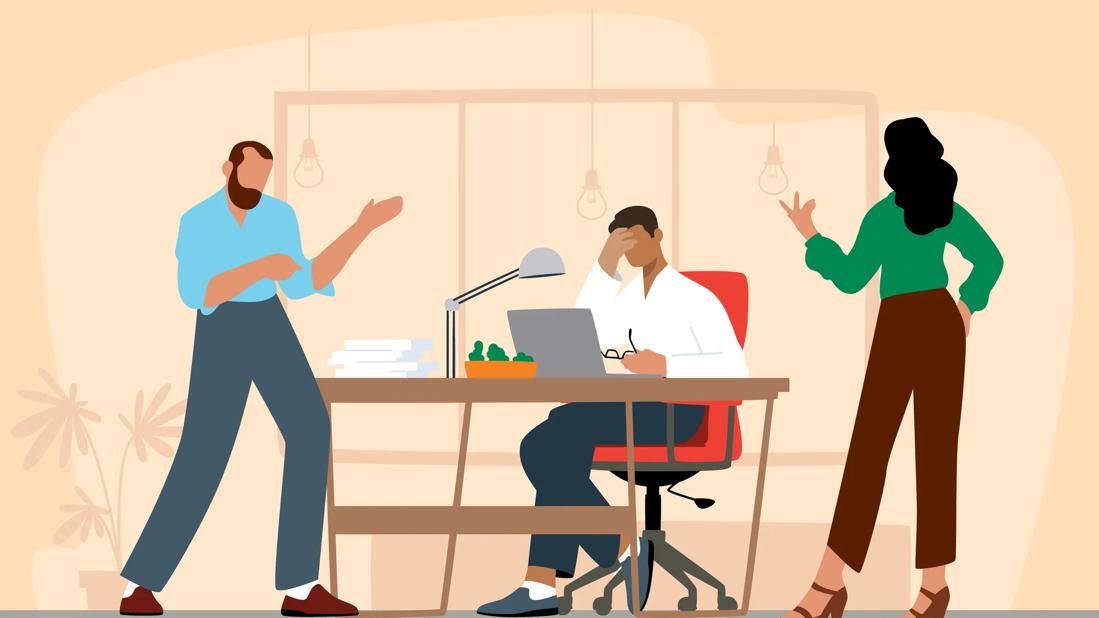Be cautious when others try to influence your decisions — especially if it goes against your values

Image content: This image is available to view online.
View image online (https://assets.clevelandclinic.org/transform/b245b91b-ef5d-4822-802a-45a8c87f4dcc/peer-pressure-work-1444834657)
Stressed person sitting at desk at work, with two coworkers adding pressure
Just give it a try. Everybody else is.
Advertisement
Cleveland Clinic is a non-profit academic medical center. Advertising on our site helps support our mission. We do not endorse non-Cleveland Clinic products or services. Policy
Odds are you’ve heard those words or something similar during your life. They’re a classic example of peer pressure, or when someone tries to manipulate your behavior.
This pull to go along with others can be a powerful force. Sometimes, that can be a good thing. Other times, it can pave a path to trouble.
So, how can you deal with peer pressure to ensure you make the best choices for you? We asked psychiatrist Hannah Snyder, MD, to explain the benefits and risks of peer pressure and how to handle it.
“Peer pressure occurs when others attempt to influence your decisions,” explains Dr. Snyder. “It can be done in a very gentle, subtle way or it can be more intense, aggressive or even bullying.”
The pressure to conform and follow along with others tends to hit hardest during adolescence and teenage years, when fitting in at school and fear of rejection take on heightened importance.
But peer pressure can affect you at any age when you’re interacting with other people.
“I think most of us expect that we’re going to run across peer pressure less often as adults, but it still happens,” says Dr. Snyder. “You really can get blindsided by it, which can make it a challenge to deal with.”
Despite “peer pressure” having a negative connotation, it can also be beneficial to you. It just depends on what’s being asked of you.
Advertisement
While peer pressure often gets a bad rap given its pull to the dark side, it can lead you to the light, too. A gentle nudge from someone can serve as motivation to better yourself in some way, says Dr. Snyder.
“Positive peer pressure can move you toward a healthier outcome,” she notes.
Real-life examples of positive peer pressure could include being encouraged to:
We’re taught what’s “right” or “wrong” at an early age, and these values guide us as we go through life. Negative peer pressure occurs when someone tries to nudge you into doing something that goes against your beliefs.
“It’s a type of peer pressure that can push you toward risky behavior that you’re uncomfortable with,” emphasizes Dr. Snyder.
Real-life examples of negative peer pressure could include being prodded to:
Negative peer pressure can put you in an uncomfortable position. Dr. Snyder offers these tips to deal with being goaded into doing something you don’t want to do.
If you continually find yourself being pressured to do things you don’t want to do by a certain person or group, you might want to reconsider how much time you spend around them.
Advertisement
“Surrounding yourself with people who share similar values may help limit negative peer pressure in your life,” suggests Dr. Snyder. “Finding a supportive peer group might even be a way to experience the benefits of positive peer pressure, too.”
Advertisement

Sign up for our Health Essentials emails for expert guidance on nutrition, fitness, sleep, skin care and more.
Learn more about our editorial process.
Advertisement
When someone has a quality or trait you admire, you may assume they have other unrelated positive qualities, too
When interacting with a challenging person, it’s best to lead with empathy, stay calm and set boundaries
This method of changing how you present yourself to fit in comes with pros and cons
‘Mind your manners’ by watching your language, challenging your assumptions and apologizing when you fall short
Role-playing, creating social opportunities and celebrating little wins can all help ease shyness
Look to activities you enjoy — or try a new hobby — to help foster meeting new people
If the thought of the gym sends you spiraling, do some prep work beforehand and bring a friend along for support
Follow the ’problem, feeling, ask‘ technique to communicate clearly and effectively
Prioritize your health by managing stress, strengthening your social connections and getting quality sleep
Bolsters, blankets, pillows and blocks can offer extra support, stability and comfort
Allergies, postnasal drip, asthma or reflux could be to blame for a cough that won’t quit